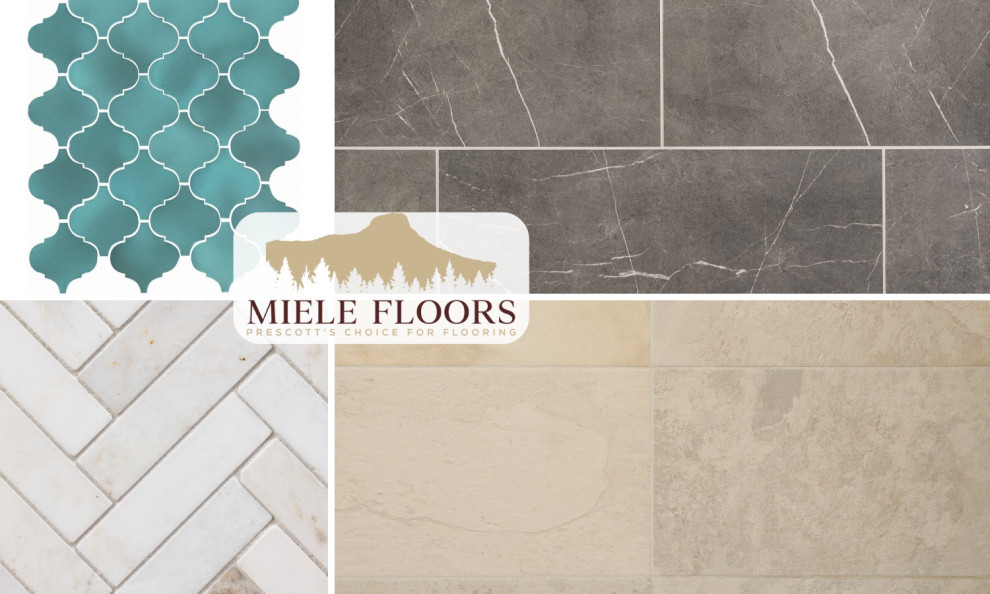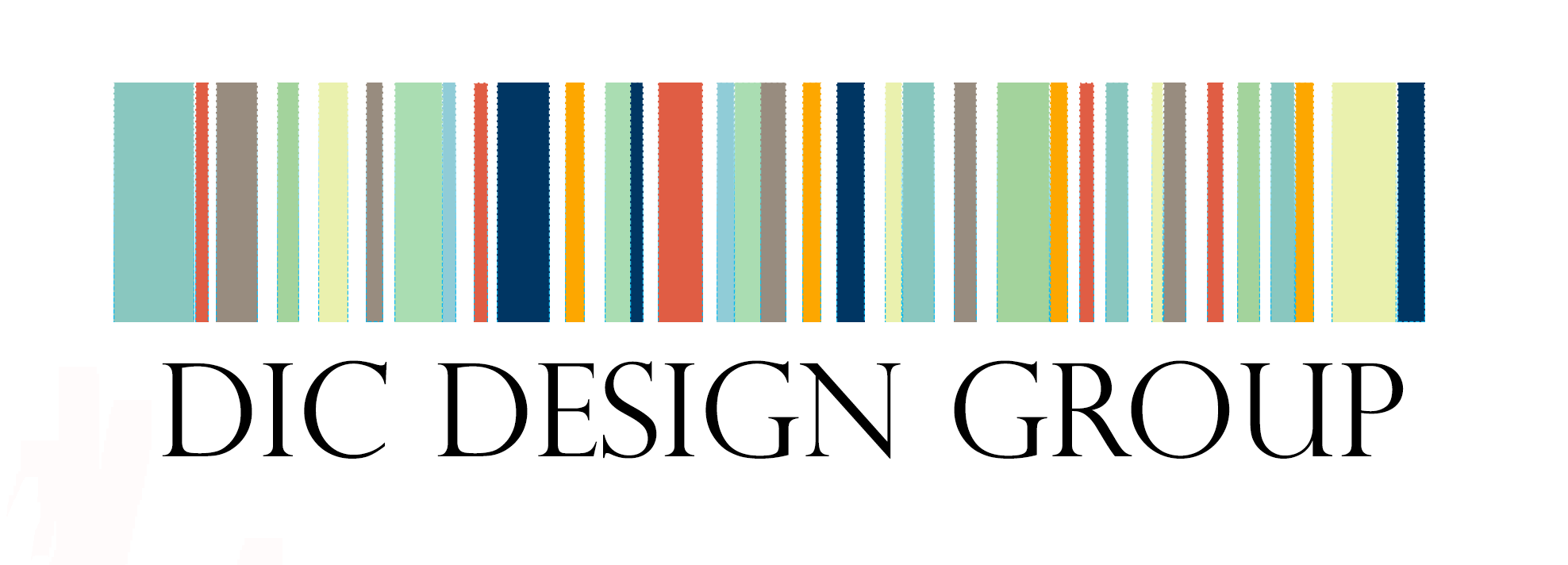Tile Materials Explained Part 1 & 2

Join me this week as I discuss "Tile Explained" featuring my guest, Jason of Miele Floors. With so many options out there in tile materials how do you know which is the best product for your space. "Tile Explained" will cover materials such as Ceramic, Porcelain and Natural Stone tile with a deeper understanding of cost and installation.
CERAMIC TILE
What is ceramic tile? It is a mixture of clas and other natural materials such as sand, quartz and water. To visualize ceramic tile, the backside is usually "clay" color and the product is generally thin although I have seen and use tiles that are much denser in weight such as saltillo tiles. Some of the best known types of ceramic tiles are stoneware tiles or porcelain stoneware. And the difference between these types is their poroisty (water absorption throught tile) their hardness.
1. Characteristics:
Ceramic tile is porous and needs to be sealed. The different types of ceramic tile that exist are classified in may ways such as:
- By the finish - glazed or unglazed
- By the location, exterior or interior , flooring or cladding
- By manufacturing process, pressing or extrusion
- By water absorption capacity, high, medium or low
- Shapes - square, rectangular, hexagonal and penny round
Ceramic and stoneware tiles: discover the collections | Ragno (ragnousa.com)
2. TILES: beveled, high gloss color, decorative designs
The porosity of the tiles is the highest through the back of the tile, never through the front enamel. The is porous and can be white, grey or red. Absorption is between 12%-20% and can sometimes reach 25%. Also, refer to the specifications for area of use.
3. Areas of Use:
Compared to porcelain tile, ceramic tile is less durable so you will want to install it in areas that have low traffic. Kitchen backsplashes, shower surrounds, flooring, and wall coverings.
4. Trim Pieces:
Trim pieces are not always available in coordinated looks so you may have to substitute with a product called Schulter for trim molding or resource from other manufactures for trim pieces such as bullnose edge, pencil liner, quarter rounds, cove base.
5. Installation Process:
Easy to install. Easy to clean. Proper installation will prolong lifespan. However, requires a wider grout joint and that will need to be sealed. Ceramic tile design layouts have many possibilities. Depending on the shape and size, you are only left with your imagination. Some patterns that I love and that are trending in today's marketplace are, Herringbone, Cheveron, Stacked Horizonal. The key to these designs is confirming that your installer is knowledgeable on the layout and cuts and understands the tools needed for cutting. Visit these weblinks below for more ideas:
Tile Layout Patterns & Design Ideas | Porcelanosa
5. Cost:
Very budget friendly - starting at $2-$ 7.00 or less per square foot, however, depending on the design could be much higher. Installation is cost depending on the area could be from $4 to $25.00 a square foot.
GLASS TILE
If you are wanting a space to feel larger and brighter by bouncing light through a room "Glass Tile" is the perfect product. Water resistant and very popular in areas with high-humidity. The surfaces are easy to clean and this product keeps it shine.
1. Characteristics:
Glass tile has many characteristics when it comes to color, sheen and texture. Some glass tiles are shiny, opaque while others can offer an iridescent pearlized look. Glass tiles come in a variety of shapes, sizes and color. Brick styled mosaics and 2"x 2" square are the most popular. Think of inset materials in shower or pools. Some types of glass tile can scratch if exposed to abrasive cleaners or other abuse.
2. Areas of Use: Contemporary more modern approach in style.
- Powder Rooms
- Shower Deco Pieces
- Kitchen Backsplashes
- Swimming Pools
Disadvantages with glass tiles is that it cannot be repaired. Glass tiles also show fingerprints and smudges so determine the area and its best use.
3. Trim Pieces:
Most glass tile collections due come with coordinating trim pieces, however, you can also use a Schulter product as mentioned above.
4. Installation Process and Cost:
Cost for glass tile material starts at $15.00 square foot and would be close to $25 - $30 to install. These types of tiles require a skilled professional installer due to the breakage in product. This is not a good product to install for a DIY person.
CEMENT TILE
I recently specified a cement tile product in a primary bath suite by Walker Zanger, called Studio Cement Parisian Blue. The installed product was absolutely stunning. See the weblink below. The only drawback was the 5/8" thickness of this tile. The application called out many area uses but it to be sealed. These tiles are typically cured or dried rather than fired, like ceramics which are made of clay.
# STUDIO CEMENT PARISIAN BLUE - Walker Zanger
1. Characteristics:
- Durable, hand-made consisting of layers
- Fire/Insect Proof
- Non-Biodegradable
- Long Lasting - don't have to worry about stains or scratches
- Handle high traffic
- Minimal maintenance
2. Areas of Use:
- Shower Walls
- Interior & Exterior Floors
- Interior & Exterior Walls
- Bathroom Floor
- Commercial Floor
3. Trim Pieces: NONE
4. Installation Process
Same as other types of tile but requires special tools / equipment due to the thickness of the material. There will be a slight grout joint. Each product will have its own installation specs so be sure to familiarize yourself with the pro's and con's of this product and also hire a professional skilled installer.
5. Cost: $25 - $35.00 per square foot with installation about the same because of the prep work and equipment need for cutting.
PORCELAIN TILE
Porcelain tile is by far the most popular of all tile products. Porcelain tile can look like wood, stone, and other natural materials. Porcelain tile offers an array sizes from 12x12 to 48x36 impressive flooring coverings. Porcelain tile are made of high density, strong, non-porous ceramic materials and can be used on floor or wall coverings. They are extremely resistant to abrasion, waterproof, hypoallergenic, safe and environmentally friendly.
1. Characteristics:
- Rectified verse non-Rectified (explain)
- Slight gap for grout
- Matte, High Gloss and offer Abrasive for Wet Applications
- High wear resistance to scratches, fading and stains
- Low Maintenance (does not require sealing)
- Styling - timeless look
- Moisture resistance
- Repairable, Fire Resistant & Static Resistant
- Residential or Commercial Applications
- Variety of shapes, sizes, finishes and patterns
DISADVANTAGES: density and hard difficult to cut
2. Areas of Use:
- Indoor & Outdoor Flooring
- Shower Floors & Walls
- Interior Walls and Backsplashes
3. Trim Pieces: You can always find coordinating trim pieces in offered Porcelain materials. Because the factory edges are finished, you do not always need to trim out the tile pieces, for instance on a shower wall. However, it is recommended that you use bullnose or Schulter trim because the look is in the details.
4. Installation Process:
Porcelain tiles are heavier to install than ceramic tiles a may be more difficult to install the larger the size of the tile. It also may be unsuitable for certain walls or exceed the maxium weight allowance for some substrates. Porcelaint tile should be installed with a latex modified thin-set or polymer modified thin-set . (Ask your installer to further explain)
Adhesives will change due to the porcelain product and area of application. Spacers are used to help create that tigher grount joint.
5. Cost: $2 - $30.00 per square foot for the material and with installation will cost close to $9 - $50 per square foot.
NATURAL STONE TILES
Natural stone is the most elegant and beautiful of all stones due to its texture and shade variation. It tends to feature heaving veining and movement. Fissures, which is a term used in the industry to describe visible separation along crystaline boundries. and cracks occur naturally in many types of these stones due to stress of handling. Chips and pitting a commonly seen characteristic expected in natural or polished stone or add to the rustic beauty of this product. Common name material for natural stone are the following:
1. Limestone: Softer in comparison to other natural stones. Generally less movement in and visually appealing. Perfect for floors, walls and offers a timeless style in neutral colors.
- Cost: The cost for this type of material ranges from $70-$200 per square foot making more expensive but still less than marble.
2. Travertine:
Travertine tiles are cheaper than marble, granite and sometimes porcelain tiles. Due to its natural characteristics the color will vary from piece to piece. Travertine is very durable and timeless in style. Travertine comes in either a hone "matte" finish or glossy and the grout joint is very small. Travertine can add value to your home. The biggest issue with travertine is that it has a very porous structure and is highly reactive to acidic substances, such as vinegar or salt. Travertine is also heavier product.
Installation need an experienced installer due to the proper cutting of material.
- Cost: Travertine can range from $5.00 to $25.00 per square foot depending on the size. And although it is comparable in cost to porcelain, the installation cost will be higher because of time use in creating a super tight grout joint.
4. Trim Pieces for stone product: Are usually created in the field during installation, although some manufacturers do offer a few.
5. Installation Process: Is tedious and labor intensive - but similar to that of porcelain using spacers and grout for the joint line. Maintenance will be required after installation either with needed additional sealer or re-polishing. Scratches can appear quite easily as well.
DISADVANTAGES: How it is handled - transport, fabrication and install.
FIREPLACE Stone Product used in previous interior spaces. (see our Portfolio page - of small figurines jumping down)
Island Stone Products:
V Parallels Tropical White Honed (islandstone.com)
Island Stone | Tile Set in Adventure | Kitchen, Bath, Outdoor and Pool
OTHER INFORMATIVE WEBLINKS:
- The 12 Different Types of Tiles, Explained by Pros
- (realsimple.com)12 different types of tile and their pros and cons |(homesandgardens.com)
* * * * * * * * * * * * * * * * * * * * * * * * * * * * * * * * * *
PROPERTY SPOTLIGHT: 7918 E. Carbon Court, Prescott Valley, AZ
brought to you by Deanna Poppenburger of REALTY ONE GROUP (Mountain Desert)
PHONE: 928-777- 1010
* * * * * * * * * * * * * * * * * * * * * * * * * * * * * * * * * *
Looking for ideas or need some help with designing your home or Kitchen?
Please contact us directly at the phone number listed below or you can email us. We always love to hear from our listeners and would love to have your feedback or questions on our radio show.
Want to share your information about your business and products?
If you are a designer, industry professional, business owner or contractor that is in the design & building industry, I would love to have you as a guest speaker on my show. Please email me your full contact details.
Be sure to follow us on social media: Instagram | Facebook @DICDesignGroup
